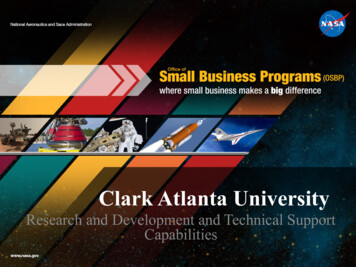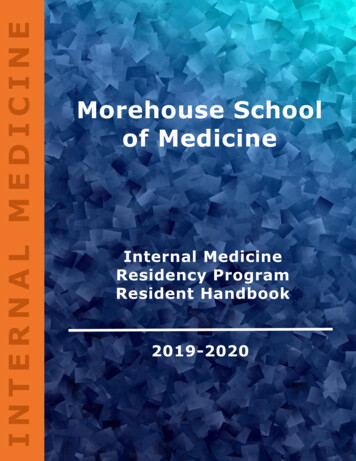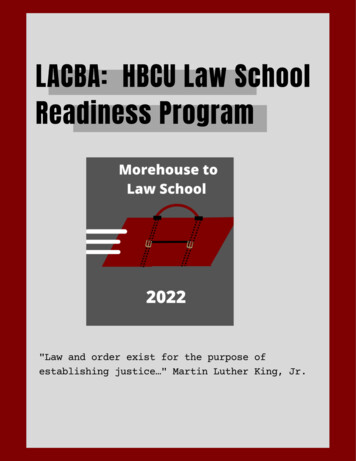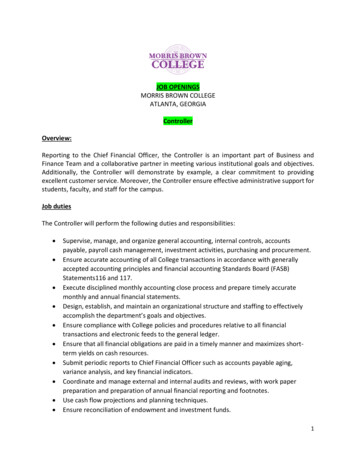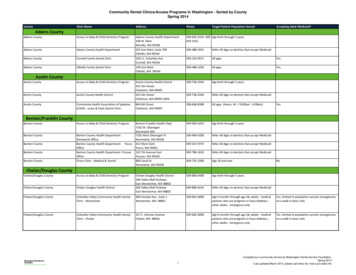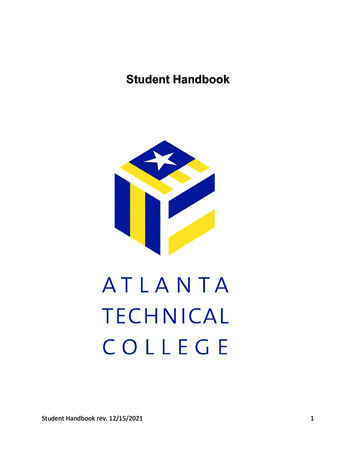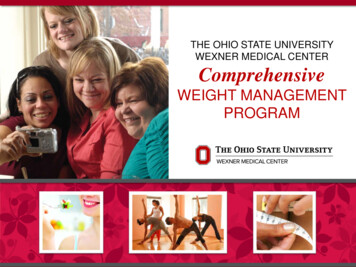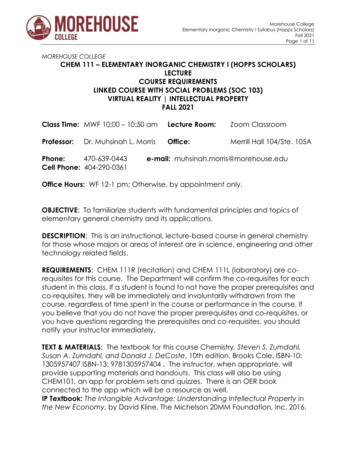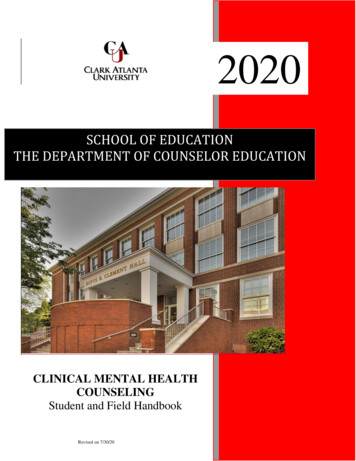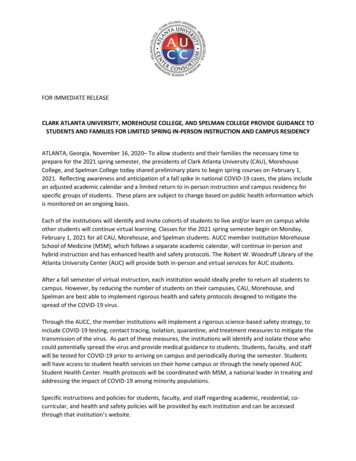
Transcription
FOR IMMEDIATE RELEASECLARK ATLANTA UNIVERSITY, MOREHOUSE COLLEGE, AND SPELMAN COLLEGE PROVIDE GUIDANCE TOSTUDENTS AND FAMILIES FOR LIMITED SPRING IN-PERSON INSTRUCTION AND CAMPUS RESIDENCYATLANTA, Georgia, November 16, 2020– To allow students and their families the necessary time toprepare for the 2021 spring semester, the presidents of Clark Atlanta University (CAU), MorehouseCollege, and Spelman College today shared preliminary plans to begin spring courses on February 1,2021. Reflecting awareness and anticipation of a fall spike in national COVID-19 cases, the plans includean adjusted academic calendar and a limited return to in-person instruction and campus residency forspecific groups of students. These plans are subject to change based on public health information whichis monitored on an ongoing basis.Each of the institutions will identify and invite cohorts of students to live and/or learn on campus whileother students will continue virtual learning. Classes for the 2021 spring semester begin on Monday,February 1, 2021 for all CAU, Morehouse, and Spelman students. AUCC member institution MorehouseSchool of Medicine (MSM), which follows a separate academic calendar, will continue in-person andhybrid instruction and has enhanced health and safety protocols. The Robert W. Woodruff Library of theAtlanta University Center (AUC) will provide both in-person and virtual services for AUC students.After a fall semester of virtual instruction, each institution would ideally prefer to return all students tocampus. However, by reducing the number of students on their campuses, CAU, Morehouse, andSpelman are best able to implement rigorous health and safety protocols designed to mitigate thespread of the COVID-19 virus.Through the AUCC, the member institutions will implement a rigorous science-based safety strategy, toinclude COVID-19 testing, contact tracing, isolation, quarantine, and treatment measures to mitigate thetransmission of the virus. As part of these measures, the institutions will identify and isolate those whocould potentially spread the virus and provide medical guidance to students. Students, faculty, and staffwill be tested for COVID-19 prior to arriving on campus and periodically during the semester. Studentswill have access to student health services on their home campus or through the newly opened AUCStudent Health Center. Health protocols will be coordinated with MSM, a national leader in treating andaddressing the impact of COVID-19 among minority populations.Specific instructions and policies for students, faculty, and staff regarding academic, residential, cocurricular, and health and safety policies will be provided by each institution and can be accessedthrough that institution’s website.
Health and SafetyHealth and safety protocols are based on guidance from the Centers for Disease Control and Prevention,World Health Organization, and Georgia Department of Public Health. Key elements include: Mandatory Testing and Monitoring of Students, Faculty, and Staff. Students, faculty, and staffwill be tested for COVID-19 prior to arriving and periodically during the semester (a minimum ofonce per week or more frequently based on health data trends). All students must produce anegative result from a COVID-19 test administered 72 hours before arriving on campus. Further,each institution will perform contact tracing relative to students who test positive for the virus,isolate students who test positive, and quarantine students who have come into close contactwith a person who has tested positive. The institutions will use technology and algorithms tomonitor symptoms and pinpoint increases in community virus transmission, as well as toperform contact tracing and to communicate with stakeholders. Social Distancing. To promote social distancing, event sizes will be limited, visitor access will berestricted, and some staff will adhere to adjusted work schedules. The campuses have alsoadjusted facilities and posted signage to indicate maximum occupancy for instructional andgathering spaces. Mandatory Face Coverings. CDC-endorsed masks must be worn in all public spaces includingthe Robert W. Woodruff Library of the AUC. AUCC campuses will provide one washable mask toall students and employees. Symptom Checking. Students, employees, and all persons entering AUCC campuses willundergo temperature checks and may need to complete an app-based symptom screeningdaily. Modified Facilities and Access to Campus. To reduce the risk of COVID-19 exposure,adjustments have been implemented related to campus entry points, pedestrian trafficpatterns, and facility layouts. In addition, the number of hand sanitizing stations has beenincreased and ventilation systems have been evaluated. Health Services. Students will have access to student health services on their home campus orthrough the newly opened, state-of-the-art AUC Student Health Center on Lee Street.Modified Academic CalendarThe academic calendar for Clark Atlanta University, Morehouse College, and Spelman College has beendesigned to reduce opportunities for potential spread of the COVID-19 virus during the 2021 springsemester. As previously announced, the start of the spring semester will be delayed until February 1,2021. There will be no official spring break. However, there will be a mid-point break from Wednesday,March 31, through Friday, April 2, 2021 (Good Friday) to help reduce stress and support mental wellbeing. The last day for final exams will be Friday, May 7, 2021. The calendar applies to all students,including both those attending in-person classes and those learning through virtual instruction.Key dates in the academic calendar for the 2021 spring semester include:2FOR IMMEDIATE RELEASE: CLARK ATLANTA UNIVERSITY, MOREHOUSE COLLEGE, AND SPELMAN COLLEGEPROVIDE GUIDANCE TO STUDENTS AND FAMILIES FOR LIMITED SPRING IN-PERSON INSTRUCTION AND CAMPUS RESIDENCY
Monday, February 1, 2021: Classes beginWednesday, March 31 and Thursday, April 1, 2021: Mid-point breakFriday, April 2, 2021: Good FridayWednesday, April 28, 2021: Last day of classThursday, April 29 and Friday, April 30, 2021: Reading DaysMonday, May 3 – Friday, May 7, 2021: Final examsWhile AUCC institutions fully recognize that no mitigation measure is guaranteed to eliminate spread ofthe virus, the measures implemented by each institution prioritize the safety of our campus community.AUCC and the member institutions will continue to monitor relevant COVID-19 data including positivityrates and local hospital capacity. This is a fluid situation which may necessitate further adjustments ifcommunity health conditions worsen. All stakeholders will need to maintain awareness and flexibility, aswell as take personal responsibility for helping to keep the AUCC community safe by adhering to AUCCrequirements, institutional policies, and public health guidelines.More information is also available at aucenter.edu. Please refer to each institution for more informationon their individual plans and policies.Clark Atlanta University: www.cau.eduMorehouse College: www.morehouse.eduMorehouse School of Medicine: www.msm.eduSpelman College: www.spelman.eduRobert W. Woodruff Library of the AtlantaUniversity Center (AUC), Inc.: www.auctr.edu― Frequently Asked Questions ―How has the academic calendar been affected?As previously announced, the first day of classes will be February 1, 2021. There will be no spring break,though there will be a shorter mid-point break beginning on Wednesday, March 31, 2021 and ending onFriday, April 2, 2021 (Good Friday). This schedule will apply both to students attending classes in personand those learning virtually.How will students who remain on campus participate in academic and co-curricular activities?In order to incorporate social distancing and reduce the size of gatherings, there will be adjustments toacademic and student co-curricular activities. Activities and events are being planned to engage allstudents, including those who will be attending virtually.How are students/faculty/staff going to be kept safe?Each AUCC institution is prepared to implement a proactive health and safety protocol designed to helpprevent the spread of COVID-19. Though specific implementation plans and details are unique to eachinstitution, each plan includes the following:3FOR IMMEDIATE RELEASE: CLARK ATLANTA UNIVERSITY, MOREHOUSE COLLEGE, AND SPELMAN COLLEGEPROVIDE GUIDANCE TO STUDENTS AND FAMILIES FOR LIMITED SPRING IN-PERSON INSTRUCTION AND CAMPUS RESIDENCY
Monitoring, Testing, Contact Tracing, and Quarantining. AUCC institutions are collaborating toimplement rigorous health and safety protocols guided by respected public healthrecommendations, data analysis, and science. Assisted by epidemiologists and public healthexperts, each campus will implement a series of safety measures including symptom tracking,surveillance testing, isolation for students who have tested positive, and quarantine for studentswho may have been exposed. Students will also have access to student health services, includingthe newly opened AUC Student Health Center on Lee Street.Mandatory Masks. In accordance with Centers for Disease Prevention and Control guidance,masks will be required for anyone in a class, gathering, meeting, or public space on an AUCCcampus.Handwashing, Hand Sanitizer, Cleaning, and General Sanitation. Anyone on an AUCC campuswill be encouraged to wash hands frequently. In addition, hand sanitizer will be readilyaccessible at locations across each campus. Further, building cleaning will be enhanced andoccur more frequently.Social Distancing and Limits on Gathering Size. Social distancing will be encouraged acrosscampuses, including limitations on gathering sizes and reductions in the number of peopleallowed to occupy various spaces and buildings.Density Limitations. Fewer people will be present on campuses this spring as in-personinstruction is focused on specific cohorts of students.Dining. Changes will be made to dining services to limit the possibility of COVD-19 exposure.Specific information is available via each institution’s website.How will on-campus living arrangements be affected?Density in most residence halls has been reduced, with fewer students sharing rooms, hallways,common spaces, and bathrooms.Will a student attending one AUCC institution be able to attend classes and visit residence halls onanother campus?Students should expect adjustments to normal campus visitation policies and restrictions on access tofacilities as each college works to mitigate any spread of the virus on its campus.Will commuter students be invited back for in-person instruction?Each institution will identify cohorts of students invited to attend in-person classes and any residencyrequirements affecting access to its campus.What if a student simply feels uncomfortable attending class?Some students who would be eligible to return to campus for the spring semester will choose not toreturn for medical or personal reasons and can continue virtual instruction. Each campus will issue4FOR IMMEDIATE RELEASE: CLARK ATLANTA UNIVERSITY, MOREHOUSE COLLEGE, AND SPELMAN COLLEGEPROVIDE GUIDANCE TO STUDENTS AND FAMILIES FOR LIMITED SPRING IN-PERSON INSTRUCTION AND CAMPUS RESIDENCY
specific, science-based guidance for residential students who are symptomatic and/or test positive forCOVID-19. There will also be institutional support in place for students who feel uncomfortableattending class for non-medical reasons.What if a faculty or staff member feels uncomfortable coming to work due to personal health risks orrisks to people living with them?Policies at each institution differ. Faculty or staff members who have underlying health conditions whichput them at greater risk or who live with people at greater risk should contact their supervisors orhuman resources departments for further guidance.What should a student do who is experiencing symptoms? Faculty and staff?Anyone experiencing symptoms which may indicate an active COVID-19 infection should immediatelyself-quarantine and seek medical attention. Students will have access to health services on theirrespective campuses or through the AUCC Student Health Center on Lee Street. The health servicesprograms will provide additional instructions about how to receive treatment (if necessary), avoidcontact with others, and receive meal service. In some cases, isolated and/or asymptomatic studentsmay still participate in remote courses and receive materials and assignments from in-person courses.Symptomatic employees, including faculty, should arrange to have a COVID-19 test through theirprimary care physician and adhere to their institutional policies for sick leave. Faculty and staff memberswho have tested positive or believe they are experiencing symptoms should not return to work andshould contact their health care provider, supervisor, and human resources representative for nextsteps regarding positive case management.Are there proactive health precautions students should take before returning?Each institution will contact eligible students regarding requirements which must be met beforereturning to campus.How is access to the library and library services affected?The Robert W. Woodruff Library of the AUC, which serves Clark Atlanta University, InterdenominationalTheological Seminary, Morehouse College, and Spelman College students, has proactively institutedpolicies to mitigate the risk of COVID-19 spread. These policies include reorganizing spaces inside thelibrary to provide for social distancing, limiting the number of people who can access the library at anygiven time, requiring personal protective equipment including masks, and enhancing the frequency ofsurface cleaning. In addition, numerous library resources are available online and library staff is availableto assist students and faculty virtually.5FOR IMMEDIATE RELEASE: CLARK ATLANTA UNIVERSITY, MOREHOUSE COLLEGE, AND SPELMAN COLLEGEPROVIDE GUIDANCE TO STUDENTS AND FAMILIES FOR LIMITED SPRING IN-PERSON INSTRUCTION AND CAMPUS RESIDENCY
Is there an impact to residence hall move-in plans?Policies at each institution will differ, but in general, move-in will occur by appointment and the numberof people allowed to assist will be limited.What will happen if there is a spike in COVID-19 cases on one of the campuses?Every effort is being made to mitigate COVID-19 spread on the AUCC campuses. However, each campusretains the flexibility to intensify mitigation actions should conditions warrant an adjustment, includingclosing buildings, isolating students who test positive, and instituting a return to virtual learning. Contacttracing will be utilized to identify any persons who may have come into contact with a person testingpositive for the virus.― AUCC COVID-19 Health and Safety Protocols ―In order to mitigate the spread and impact of COVID-19, each institution within the Atlanta UniversityCenter is responsible for setting and enforcing their own specific health and safety protocols as theyrelate to students, faculty, staff, and visitors. Students also have access to comprehensive medicalhealth services provided on their campus or through the newly established AUCC Student Health Centeron Lee Street. Because of close proximity and shared programs, AUCC institutions have implementedprocesses and protocols which mutually benefit the collective community, including: universal testing of students, faculty, staff, and recurring vendors requiring masks in all public spaces, classes, and gatherings including those in the Robert W.Woodruff Library of the AUC daily symptom testing including fever checks for people arriving on campus institutionalized social distancing policies frequent handwashing and use of hand sanitizer use of technology and algorithms to monitor symptoms and pinpoint increases in communityvirus transmission, as well as to perform contact tracing and to communicate with stakeholdersTestingTesting for COVID-19 can reveal an individual’s health status at a point in time. Though no mitigation isguaranteed to stop the spread of the virus, testing is a vital component of the AUC mitigation plan.Moreover, testing is a service which helps individuals know if they have the virus, prompting them toseek proper information and treatment. Testing is not 100% accurate and just because someonereceives a negative result does not necessarily mean that they are not carrying the virus. Nonetheless,testing is one of the most effective ways to identify infected persons and prevent spread (especially inconcert with other mitigation measures such as handwashing, wearing masks, and social distancing).Anyone who routinely accesses an AUCC campus or facility must be tested according to frequencyintervals established by campus community health officials. Further, CAU, Morehouse, and Spelman6FOR IMMEDIATE RELEASE: CLARK ATLANTA UNIVERSITY, MOREHOUSE COLLEGE, AND SPELMAN COLLEGEPROVIDE GUIDANCE TO STUDENTS AND FAMILIES FOR LIMITED SPRING IN-PERSON INSTRUCTION AND CAMPUS RESIDENCY
students, faculty, and staff must be tested prior to arriving on a campus for the 2021 spring semester.This includes first-time students.Testing is required whether or not someone has previously tested positive for COVID-19 and will beperformed routinely to ensure community health and reduction of COVID-19 spread. The frequency ofsurveillance testing will be determined according to a number of factors including, but not limited to:regional infection rates, positivity rates in the community, and other circumstantial considerationsincluding events, activities, or occasions that may prompt a spike in positive cases.The test most commonly endorsed and utilized by MSM for AUCC faculty, staff, and students is apolymerase chain reaction (PCR) test. PCR tests detect the COVID-19 virus by searching for the presenceof RNA, the virus’s basic genetic material, inside a person. The virus’s RNA will be present only if aperson is currently infected.The PCR test differs from an antibody test. An antibody test can be used to determine if a person hashad the virus in the past by examining a person’s bloodstream for the presence of a specific antibodyproduced by the body’s immune system to defend against the virus.Testing Information for Students All students must produce a negative result from a test administered 72 hours before arriving oncampus. Those who test positive will not be admitted to residential facilities or allowed toattend in-person classes during the 2021 spring semester until an isolation period has concludedand they produce a negative test according to their institution’s policies for COVID-19mitigation.Information about available testing will be forthcoming from each student’s home institution.Students will need to notify their institution about their COVID-19 status based on the test priorto arrival on campus.AUCC-provided TestsCoordinated through AUCC and MSM, community testing will be made available at no cost to allstudents, faculty, and staff members once the semester begins. MSM and AUCC, in turn, have partneredwith well-respected laboratories and public health companies to process tests and provide results in atimely manner.Tests Not Administered through an AUCC InstitutionNumerous opportunities for testing are available, and it is acceptable for students, faculty, and staff toobtain a test elsewhere in lieu of the test provided by their respective institutions. Testing by anotherentity, however, must meet the following conditions to be accepted: results of the test must be obtained prior to arrival on campus;7FOR IMMEDIATE RELEASE: CLARK ATLANTA UNIVERSITY, MOREHOUSE COLLEGE, AND SPELMAN COLLEGEPROVIDE GUIDANCE TO STUDENTS AND FAMILIES FOR LIMITED SPRING IN-PERSON INSTRUCTION AND CAMPUS RESIDENCY
the test most commonly endorsed by AUCC and MSM is a PCR test (explained above), asopposed to an antibody or saliva test; andtesting results must be submitted to the appropriate institutional department.Note that, once the spring semester begins, students will be expected to self-monitor for indications ofCOVID-19 through a symptom tracker and will be subject to temperature checks while on campus.Testing Information for EmployeesAll employees at AUCC institutions must receive a negative test result before reporting to work oncampus for the 2021 spring semester. Employees may obtain their own valid test (at their ownexpense— see above requirements) or participate in AUCC-wide employee COVID-19 testing. MSM will collaborate with AUCC sites to set up unmonitored, self-administered COVID-19 testsites at the respective campuses. Participants will be required to set up a web or app-based account to activate a test kit andreceive their results. At designated times, employees will be able to report to the test site and pick up a test kit. Theywill be required to activate their kit through their account. Participants will collect their own sample through a nasal swab contained in the kit. Cleardirections are provided in each kit. The participant will seal the swab in the provided container and deposit the sample in adesignated receptacle for packaging and processing. Participants will receive notification that their results are available and can be reviewed throughtheir account. Results are typically available in less than 48 hours. Anyone who receives a positive result should not report to campus but should contact theirdesignated campus official immediately for further instruction.All individuals reporting to AUCC facilities will be required to comply with routine temperature andsymptom checks upon arrival on campus each day. In addition, as the semester progresses, campuseswill use data and algorithms to determine when individuals with access to an AUCC campus shouldundergo additional testing.Daily Symptom and Temperature ChecksAlthough less effective than full-scale testing, symptom and temperature checks can alert symptomaticpersons that they have symptoms consistent with the virus and allow the institutions to immediatelyapply mitigation procedures which prevent spread. Upon re-entry to an AUCC campus, all employeesand students will be screened to ensure that they are not displaying any obvious symptoms.8FOR IMMEDIATE RELEASE: CLARK ATLANTA UNIVERSITY, MOREHOUSE COLLEGE, AND SPELMAN COLLEGEPROVIDE GUIDANCE TO STUDENTS AND FAMILIES FOR LIMITED SPRING IN-PERSON INSTRUCTION AND CAMPUS RESIDENCY
MaskingNumerous studies have indicated that mask wearing is effective in reducing the spread of COVID-19,particularly when all parties in proximity to one another are wearing multi-layered masks. All students,faculty, staff, and approved visitors will be required to wear masks in public places or in areas wheresocial distancing cannot be effectively practiced. Students should bring and wear their own masks.Additionally, one mask will be provided by their institutions. Persons not wearing a mask will be deniedentry into public spaces.Handwashing and HygieneEvery person on an AUC campus is expected to be vigilant about personal hygiene, both to preventcontraction of the virus and to prevent its spread from an infected person to others.--Handwashing. Hands should be washed often with soap and water for at least 20 seconds,especially after a visit to a public place, or after nose-blowing, coughing, or sneezing. If soap andwater are not readily available, a hand sanitizer containing at least 60% alcohol should beutilized.Touching face. Touching of eyes, nose, and mouth with unwashed hands should be avoided.Coughing. The fold of an arm should be used to cover the mouth and nose whenever a personcoughs or sneezes.Each institution’s protocols are informed by public health experts at Morehouse School of Medicine anda review of best practices developed through MSM’s in-person operations during the 2020 summersemester. These practices are also informed by the latest scientific research on the virus and currentguidance provided by the CDC and federal and regional health agencies.About the Atlanta University Center Consortium (AUCC). The Atlanta University Center Consortium (AUCC) is theoldest and largest academic consortium serving primarily African-American students. Its members are fourtrailblazing historically Black colleges and universities (HBCUs)— Clark Atlanta University, Morehouse College,Morehouse School of Medicine, and Spelman College— which include two highly-ranked liberal arts colleges, acomprehensive research university, and a medical school. Together, Atlanta University Center (AUC) institutionsconfer undergraduate and graduate degrees across a range of disciplines and their graduates are leaders in theirchosen fields. In addition, AUC research addresses a broad range of global challenges, with a particular focus onissues and disparities facing minority populations. For more information, visit www.aucenter.edu.About Clark Atlanta University. Established in 1988 by the consolidation of Atlanta University (1865) and ClarkCollege (1869), Clark Atlanta University (CAU) is one of the nation’s foremost research institutions, offeringstudents from around the United States and several foreign countries the opportunity to engage in 38 excitingareas of study at the bachelor’s, master’s, and doctoral levels. Located in the historic heart of Atlanta, one of theworld's great international cities, CAU’s nearly 4,000 students enjoy access to academic and co-curricularexperiences, from forensic debate, to on-air broadcasting, to cancer research with world-renowned investigators.From the arts to zoology, CAU combines nearly 300 years of tradition with a solid focus on academic excellence toproduce leaders who will shape the future of the global community. Notable alumni include: James Weldon9FOR IMMEDIATE RELEASE: CLARK ATLANTA UNIVERSITY, MOREHOUSE COLLEGE, AND SPELMAN COLLEGEPROVIDE GUIDANCE TO STUDENTS AND FAMILIES FOR LIMITED SPRING IN-PERSON INSTRUCTION AND CAMPUS RESIDENCY
Johnson, American civil rights activist, poet, and song writer, (“Lift Every Voice and Sing,” the Black nationalanthem); Ralph David Abernathy Sr., American civil rights activist; Congressman Hank Johnson, Georgia District 4;Kenya Barris, American award-winning television and movie producer; Kenny Leon, Tony Award-winning Broadwaydirector; Jacque Reid, Emmy Award-winning television personality and journalist; Brandon Thompson, VicePresident of Diversity and Inclusion for NASCAR; Valeisha Butterfield Jones, Chief Diversity and Inclusion Officer atthe Recording Academy. To learn more about Clark Atlanta University, visit www.cau.edu.About Morehouse College. Morehouse College is the only historically Black college focused on educating men.Founded in 1867, the College is the nation’s top producer of Black men who go on to receive doctorates. Morehouseis also the top producer of Rhodes Scholars among HBCUs with five Morehouse Men receiving the honor. TheCollege was recently included on the list of U.S. institutions that produced the most 2019-20 Fulbright Scholars, thenation's flagship international educational exchange program. Prominent alumni include: Martin Luther King Jr.,Nobel Peace Prize Laureate; Dr. David Satcher, former U.S. Surgeon General; Shelton “Spike” Lee, award-winningAmerican filmmaker; Maynard H. Jackson, the first African American mayor of Atlanta; and Jeh Johnson, formerU.S. Secretary of Homeland Security. Morehouse currently has more than 17,000 alumni in 14 countries. For moreinformation, visit www.morehouse.edu.About Morehouse School of Medicine. Morehouse School of Medicine, located in Atlanta, GA, exists to improve thehealth and well-being of individuals and communities; increase the diversity of the health professional and scientificworkforce; and address primary health care through programs in education, research, and service, with emphasison people of color and the underserved urban and rural populations in Georgia, the nation, and the world. MSM isamong the nation's leading educators of primary care physicians and has twice been recognized as the topinstitution among U.S. medical schools for its dedication to the social mission of education. The faculty and alumniare noted in their fields for excellence in teaching, research, and public policy, and are known in the community forexceptional, culturally appropriate patient care. Morehouse School of Medicine is accredited by the Commission onColleges of the Southern Association of Colleges and Schools to award doctorate and master’s degrees. For moreinformation, visit www.msm.edu.About Spelman College. Founded in 1881, Spelman College is a leading liberal arts college widely recognized as theglobal leader in the education of women of African descent. Located in Atlanta, the College’s picturesque campus ishome to 2,100 students. Spelman is the country's leading producer of Black women who complete PhDs in science,technology, engineering, and math (STEM). The College’s status is confirmed by U.S. News & World Report, whichranked Spelman No. 54 among all liberal arts colleges, No. 19 for undergraduate teaching, No. 4 for social mobilityamong liberal arts colleges, and No. 1 for the 14th year among historically Black colleges and universities. The WallStreet Journal ranked the College No. 3, nationally, in terms of student satisfaction. Recent initiatives include adesignation by the Department of Defense as a Center of Excellence for Minority Women in STEM, a Gender andSexuality Studies Institute, the first endowed queer studies chair at an HBCU, and a program to increase thenumber of Black women PhDs in economics. New majors have been added, including documentary filmmaking andphotography, and partnerships have been established with MIT’s Media Lab, the Broad Institute, and the ArmyResearch Lab for artificial intelligence and machine learning. Outstanding alumnae include Children’s Defense F
STUDENTS AND FAMIL IES FOR LIMITED SPRING IN-PERSON INSTRUCTION AND CAMPUS RESIDENCY . ATLANTA, Georgia, November 16, 2020- To allow students and their families the necessary time to . The academic calendar for Clark Atlanta University, Morehouse College, and Spelman College has been designed to reduce opportunities for potential spread of .
